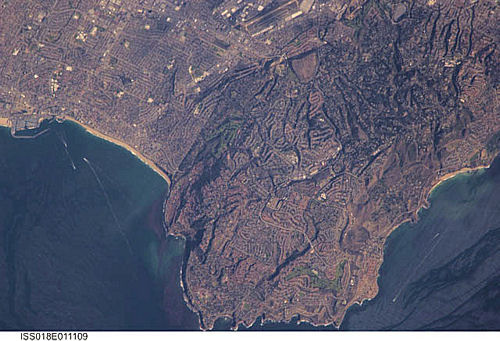|

International Space Station
800mm Photograph
Image credit:
Image Science and Analysis
Laboratory, NASA Johnson Space Center (http://eol.jsc.nasa.gov)
|
SAN
PEDRO MOLLUSK SHELL FOSSILS 33.74N, 118.28W
The link is to a general geology of
Orange County California including the Lomita Marl from the
Pleistocene Epoch.
"The Pleistocene deposits that mainly
occur along the northern flank of the Palos Verdes Hills and
in San Pedro consists of middle Pleistocene Lomita Marl,
Timms Point Silt and San Pedro Sand unconformably overlain
by upper Pleistocene Palos Verdes Sand. The
Lomita Marl
contains a fossil assemblage dominated by abundant mollusks
and foraminifers indicating outer sub-littoral, moderately
deep cool water in the lower beds and warm shallower inner
sub-littoral water in the upper beds. The Timms Point Silt
contains an assemblage of abundant mollusks and common
foraminifers indicating deposition at depths greater than 92
meters in cool water. The Sand Pedro Sand contains a
scattered assemblage of common mollusks indicating
deposition at a depth of 92 meters near base, to about 18-27
meters at top in a mostly deltaic environment. The overlying
Palos Verdes Sand contains very abundant mollusks indicating
deposition in warm water at depths ranging from 0 to 27
meters, which is inner sub-littoral. Of the approximately 13
terraces that step up the Palos Verdes Hills, only the
youngest and lowermost three or four terraces have provided
the prolific fossil finds." From a description of a talk
given by Stephen E. Jacobs "PALOS VERDES
PENINSULA: SURVIVORS OF THE WORLD'S RICHEST COLLECTIONS OF
PLEISTOCENE MARINE INVERTEBRATE FOSSILS" GSA -
Cordilleran Section - 101st Annual Meeting (April 29–May 1,
2005)
|